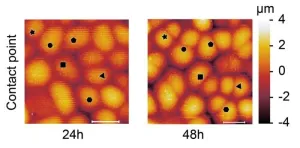(Press-News.org) SAN DIEGO, October 2, 2023 — A novel liquid biopsy test may help determine which patients with non-small cell lung cancer that has spread beyond the lungs are most likely to benefit from targeted, high-dose radiation, rather than drug-based therapy, a new study suggests. Findings will be presented today at the American Society for Radiation Oncology (ASTRO) Annual Meeting and published in npj Precision Oncology.
The study found that a liquid biopsy test – which identifies tumor DNA circulating in the blood – can help distinguish if a patient’s cancer has spread to just a few tumor sites or spread more widely. This indicator would help physicians determine which type of treatment would be most effective for each patient.
“Our findings suggest the level of circulating tumor DNA, rather than the number of tumors themselves, is a more precise measure of disease burden,” said senior study author Aadel Chaudhuri, MD, PhD, an assistant professor of radiation oncology at the Siteman Cancer Center of Washington University School of Medicine in St. Louis.
Non-small-cell lung cancer (NSCLC) accounts for about 84% of all lung cancers, which are the leading cause of cancer death in the U.S. and worldwide. Patients diagnosed with NSCLC who have widespread metastatic disease, where cancer spreads past a person’s lungs and lymph nodes, generally cannot be cured, said Dr. Chaudhuri. But some patients with oligometastatic disease – where the cancer has spread to just a few sites – experience long periods of cancer-free survival when treated with high-dose radiation targeted to the individual tumor sites.
Identifying which patients with oligometastatic disease will benefit from this type of focused radiation treatment has been challenging, said Dr. Chaudhuri.
Tumor tissue biopsy – long considered the gold standard for analyzing solid tumors – only examines the site where the tissue sample was taken, and imaging tests also have limitations for detecting micro-metastatic disease, Dr. Chaudhuri explained. Likening a visible tumor to an iceberg, he said it’s difficult for imaging tests to show “if the disease is just the part of the iceberg that’s visible above the water, or if there’s substantially more micro-metastatic disease beneath the surface.”
Liquid biopsy tests can detect elements of solid tumor cancers in blood, urine or cerebrospinal fluid. Blood tests are the most widely used type of liquid biopsy and can identify circulating tumor DNA (ctDNA), circulating tumor cells (CTC), circulating RNA and other biomarkers that signal the presence of cancer.
“Liquid biopsy,” said Dr. Chaudhuri, “could help us know if there is micro-metastatic disease.”
Dr. Chaudhuri and his colleagues previously used liquid biopsy technology to monitor the status of patients with colorectal cancer, bladder cancer and peripheral nerve tumors.
In the current study, a real-world, multi-institutional analysis, the researchers analyzed data from 2016 to 2022 for 309 patients with oligometastatic NSCLC who received radiation therapy following liquid biopsy. Oligometastatic disease was defined in this study as metastatic disease in at least one, and up to five, organ systems. Patients were an average of 64.7 years old.
Patients with detectable ctDNA prior to radiation therapy had worse overall survival than those whose blood showed no detectable ctDNA prior to treatment. For those whose blood showed traces of ctDNA, median overall survival was 16.8 months, compared to 25 months for patients with no ctDNA detected prior to treatment (p=0.030, HR=1.65, CI=1.05–2.61).
Likewise, progression-free survival was worse for those whose blood showed traces of ctDNA prior to radiation therapy. Median progression-free survival was 5.4 months for patients with detectable ctDNA, compared to 8.8 months for those with no detectable ctDNA prior to treatment (p=0.004, HR=1.57, CI=1.15–2.13). These findings were corroborated by multivariate models that included eight additional clinical and genomic parameters.
The findings suggest that patients with no or low levels of detectable ctDNA are most likely to benefit from radiation therapy, whereas those with higher detectable levels of ctDNA are more likely to need systemic therapy, such as chemotherapy or immunotherapy, Dr. Chaudhuri said.
“When you have a detectable ctDNA level, you have a higher burden of disease. Our findings indicate that we can use this biomarker to support patient-centered treatment decisions in the oligometastatic cancer setting,” he said.
###
See this study presented:
News Briefing: Tuesday, October 3, 9:00 a.m. Pacific time. Details here. Register here.
Scientific Presentation: Monday, October 2, 11:25 a.m. Pacific time, San Diego Convention Center. Email press@astro.org for access to the livestream or recording.
Abstract Title: Circulating tumor DNA for early risk stratification of oligometastatic lung cancer (Abstract 149)
Attribution to the American Society for Radiation Oncology (ASTRO) Annual Meeting is requested in all coverage. View our meeting press kit at www.astro.org/annualmeetingpress.
ABOUT ASTRO
The American Society for Radiation Oncology (ASTRO) is the largest radiation oncology society in the world, with nearly 10,000 members who are physicians, nurses, biologists, physicists, radiation therapists, dosimetrists and other health care professionals who specialize in treating patients with radiation therapies. Radiation therapy contributes to 40% of global cancer cures, and more than a million Americans receive radiation treatments for cancer each year. For information on radiation therapy, visit RTAnswers.org. To learn more about ASTRO, visit our website and media center and follow us on social media.
END
Liquid biopsy may help identify which patients with non-small cell lung cancer will benefit most from radiation
Findings suggest levels of circulating tumor DNA are more important than the number of lesions in determining disease burden
2023-10-02
ELSE PRESS RELEASES FROM THIS DATE:
Pumped for frigid weather: study pinpoints cold adaptations in nervous system of Antarctic octopus
2023-10-02
By Wynne Parry
Laden with dissolved salt, Antarctic waters can hover just above freezing and even dip below it. Temperatures this low would likely kill the animals that prosper in warmer waters further north. Yet, some creatures have found ways to live in this inhospitable cold.
In a new study described in Proceedings of the National Academy of Sciences, researchers at the Marine Biological Laboratory (MBL) and their collaborators focused on how life in such a frigid habitat has altered an enzyme essential ...
Scientists identify evolutionary gateway helping pneumonia bacteria become resistant to antibiotics
2023-10-02
**Strictly embargoed until 20:00 (BST) Monday 2 October 2023**
Scientists identify evolutionary gateway helping pneumonia bacteria become resistant to antibiotics
A new study from the University of Sheffield has revealed how pneumonia cells start to become resistant to penicillin antibiotics
The effectiveness of antibiotics is increasingly under threat as the bacteria which cause pneumonia become more resistant to antibiotic treatment over time
The new research is a major step forward in helping scientists to better predict which ...
How new plant cell walls change their mechanical properties after cell division
2023-10-02
Scientists reveal new plant cell walls can have significantly different mechanical properties compared to surrounding parental cell walls, enabling cells to change their local shape and influence the growth of plant organs.
This is the first time that scientists have related mechanics to cell wall “age” and was only made possible through a new method that follows the same cells over time and through successive rounds of division.
The Cambridge researchers were able to see new walls forming and then measure their mechanical properties. This pioneering work showed that new cell walls in some plants are 1.5 times stiffer than the surrounding ...
Study shows how ‘superbacteria’ were prevented from spreading in a large tertiary hospital
2023-10-02
Rapid identification of patients contaminated by “superbacteria” known as “carbapenem-resistant Enterobacteriaceae” (CRE), with early isolation of these patients, reduces transmission in hospital emergency departments. However, keeping them in the emergency room (ER) for more than two days undermines containment because it increases the risk of infection via colonization.
These are the key findings of a study by a group at the University of São Paulo’s Medical School (FM-USP) in Brazil. An article on the study is published in the journal Clinical Infectious Diseases.
Enterobacteria ...
MDMA increases feelings of connection during conversation, showing promise for therapy
2023-10-02
MDMA, commonly known as ecstasy, is a recreational psychedelic drug often used at parties and dance clubs because it creates feelings of closeness and social connection with others. Because of this “empathogenic” effect, researchers are also interested in its potential use as a complement to traditional talk therapy. In fact, two recent successful clinical trials support the use of MDMA-assisted therapy as a treatment for post-traumatic stress disorder (PTSD).
Researchers at the University of Chicago published a study in Scientific Reports on September 22, 2023, that looked more closely at the pharmacological ...
Internationally recognized thoracic oncologist Dr. Taofeek K. Owonikoko named Executive Director of the University of Maryland Marlene and Stewart Greenebaum Comprehensive Cancer Center
2023-10-02
University of Maryland School of Medicine (UMSOM) Dean Mark T. Gladwin, MD, and University of Maryland Medical Center (UMMC) President and CEO Bert W. O’Malley, MD, announced today that Taofeek K. Owonikoko, MD, PhD, a distinguished physician-scientist with a global reputation in thoracic oncology, has been appointed Executive Director of the University of Maryland Marlene and Stewart Greenebaum Comprehensive Cancer Center (UMGCCC). Dr. Owonikoko will join the UMSOM faculty as the Marlene and Stewart Greenebaum Professor in Oncology in the Department of Medicine and Executive Director of the UMSOM ...
Meat taxes and other livestock emissions regulations could be feasible, acceptable and effective, argue climate researchers
2023-10-02
Meat taxes and other livestock emissions regulations could be feasible, acceptable and effective, argue climate researchers.
####
Article URL: https://journals.plos.org/climate/article?id=10.1371/journal.pclm.0000291
Article Title: High ‘steaks’: Building support for reducing agricultural emissions
Author Countries: Germany, UK
Funding: This work was financially supported by the Robert Bosch foundation (Junior Professorship grant to LM) The funder had no role in study design, data collection and analysis, decision to publish, ...
Accelerated radiation treatment could reduce head and neck cancer patient burden in low- and middle-income countries
2023-10-02
SAN DIEGO, October 2, 2023 — A type of head and neck cancer predominantly diagnosed in people who reside in low- and middle-income countries may be treated effectively with fewer, but higher doses of radiation, a large new international study suggests.
The study – a randomized phase III clinical trial involving 10 countries across four continents – found delivering a course of radiation in 20 rather than 33 treatment sessions was just as effective at controlling cancer for patients with alcohol and tobacco-related, locally advanced disease, without increasing side ...
October issues of American Psychiatric Association journals look at factors influencing depression and PTSD, guidance on handling drugs laced with fentanyl, and more
2023-10-02
The latest issues of three of the American Psychiatric Association’s journals, The American Journal of Psychiatry, Psychiatric Services and The American Journal of Psychotherapy are now available online.
The October issue of The American Journal of Psychiatry is focused on research devoted to understanding factors influencing depression, PTSD, and suicidal behavior. Highlights include:
Genetic Contribution to the Heterogeneity of Major Depressive Disorder: Evidence From a Sibling-Based Design Using Swedish National Registers.
Maternal Perinatal Stress Trajectories and Negative Affect and Amygdala Development in Offspring.
Networks of Neurodevelopmental Traits, Socioenvironmental ...
Men with metastatic prostate cancer live longer thanks to new drugs
2023-10-02
Survival rates for men with metastatic prostate cancer have increased by an average of six months, something which coincides with the gradual introduction of ‘dual treatment’ since 2016. This is according to a register study of all Swedish men diagnosed between 2008 and 2020. The results are published in the medical journal JAMA Network open.
Dual treatment means that patients receive both standard hormone therapy (GnRH therapy) and chemotherapy or androgen receptor blockers. Research has previously shown that men receiving this treatment live approximately one year longer than those receiving GnRH treatment alone.
“Dual treatment for men with newly diagnosed metastatic ...
LAST 30 PRESS RELEASES:
Scientists show how to predict world’s deadly scorpion hotspots
ASU researchers to lead AAAS panel on water insecurity in the United States
ASU professor Anne Stone to present at AAAS Conference in Phoenix on ancient origins of modern disease
Proposals for exploring viruses and skin as the next experimental quantum frontiers share US$30,000 science award
ASU researchers showcase scalable tech solutions for older adults living alone with cognitive decline at AAAS 2026
Scientists identify smooth regional trends in fruit fly survival strategies
Antipathy toward snakes? Your parents likely talked you into that at an early age
Sylvester Cancer Tip Sheet for Feb. 2026
Online exposure to medical misinformation concentrated among older adults
Telehealth improves access to genetic services for adult survivors of childhood cancers
Outdated mortality benchmarks risk missing early signs of famine and delay recognizing mass starvation
Newly discovered bacterium converts carbon dioxide into chemicals using electricity
Flipping and reversing mini-proteins could improve disease treatment
Scientists reveal major hidden source of atmospheric nitrogen pollution in fragile lake basin
Biochar emerges as a powerful tool for soil carbon neutrality and climate mitigation
Tiny cell messengers show big promise for safer protein and gene delivery
AMS releases statement regarding the decision to rescind EPA’s 2009 Endangerment Finding
Parents’ alcohol and drug use influences their children’s consumption, research shows
Modular assembly of chiral nitrogen-bridged rings achieved by palladium-catalyzed diastereoselective and enantioselective cascade cyclization reactions
Promoting civic engagement
AMS Science Preview: Hurricane slowdown, school snow days
Deforestation in the Amazon raises the surface temperature by 3 °C during the dry season
Model more accurately maps the impact of frost on corn crops
How did humans develop sharp vision? Lab-grown retinas show likely answer
Sour grapes? Taste, experience of sour foods depends on individual consumer
At AAAS, professor Krystal Tsosie argues the future of science must be Indigenous-led
From the lab to the living room: Decoding Parkinson’s patients movements in the real world
Research advances in porous materials, as highlighted in the 2025 Nobel Prize in Chemistry
Sally C. Morton, executive vice president of ASU Knowledge Enterprise, presents a bold and practical framework for moving research from discovery to real-world impact
Biochemical parameters in patients with diabetic nephropathy versus individuals with diabetes alone, non-diabetic nephropathy, and healthy controls
[Press-News.org] Liquid biopsy may help identify which patients with non-small cell lung cancer will benefit most from radiationFindings suggest levels of circulating tumor DNA are more important than the number of lesions in determining disease burden



